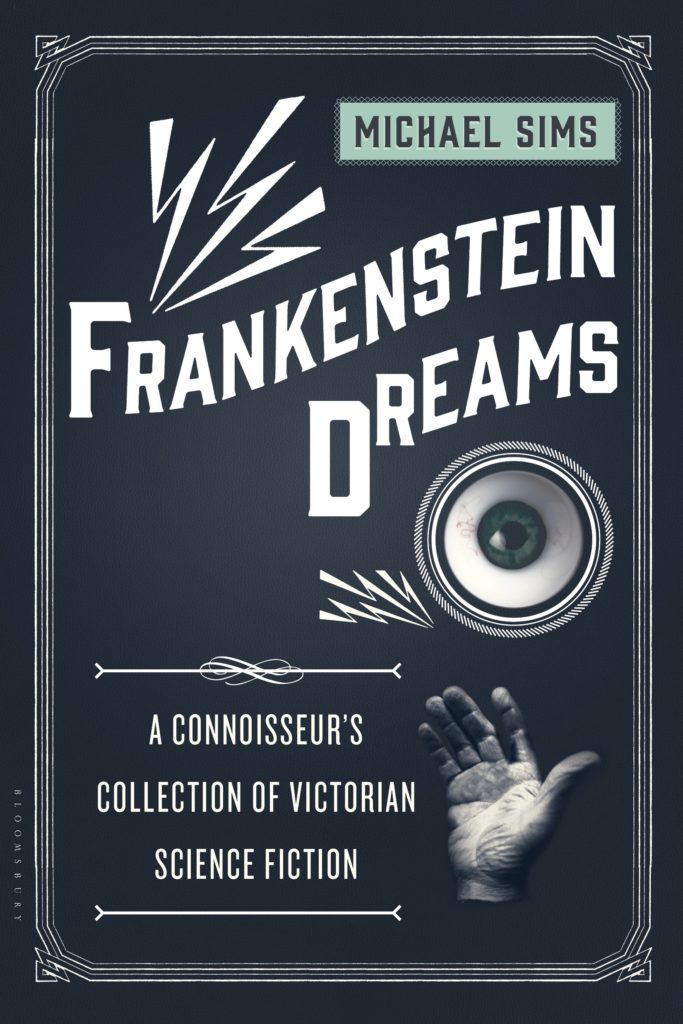Michael Sims has another stunning anthology to his name. This is the fourth in the “Connoisseur’s Collection,” Victorian-era stories on a theme. Here Sims has focused on early science fiction stories, though perhaps not the kind you would first assume. Using Mary Shelley’s seminal work, Frankenstein, as a starting point on the timeline, readers are given glimpse into the mindset of the day.
For the Victorian, science fiction was not so much about alien invasions or robots taking over the human race (although there was some of that too). The writers applied the tenets of naturalism and newfound knowledge to a little bit of imagination. In this way, these stories are more like speculative fiction, exploring the “what-ifs” of the natural world.
Sims writes in the introduction:
Within the pages of this collection, therefore, readers may consider “science fiction” to be loosely defined as tales of the fantastic that exclude the supernatural — no ghosts, no deities, no magic. What may sound like an arbitrary distinction actually demonstrates separate ways for regarding the cosmos.
Many of the stories are couched in the (fictional) doctor’s or a reporter’s notebook, giving it the appearance of a unbiased observation. With the “Man-Bats on the Moon”, the writing was sprinkled with so many scientific terms and theories, that readers assumed it to be true reporting. “The Monster of Lake LaMetrie” is written as the serious journal of a doctor in search of a creature in the still untamed West.
Other stories take a less literal approach in their telling, but still examine subjects which were concerning for many people. “The Facts in the Case of M. Valdemar” centers on hypnosis and “Wireless” wonders how humanity will adjust to radio connectivity.
As Spiritualism began to take hold in the second half of the 19th century, ideas around the scientific possibilities of other dimensions found its way into short stories and literature. “The Automaton Ear” and “The Telescopic Eye” imagine people who have the unusual ability to hear or see into another time or place. “Mysterious Disappearances” by Ambrose Bierce suggests that individuals in a rural area are simply slipping into another dimension. I couldn’t help but think of the original Village of the Damned while reading it, and it might be my favorite in this book.
This was the matter: the trail of the young man had abruptly ended, and all beyond was smooth, unbroken snow. The last footprints were as conspicuous as any in a line; the very nail-marks were distinctly visible. Mr. Ashmore looked upward, shading his eyes with his hat held between them and the lantern. The stars were shining; there was not a cloud in the sky; he was denied the explanation which had suggested itself, doubtful as it would have been — a new snowfall with a limit so plainly defined. ~Pg. 237 (from “Mysterious Disappearances”)
I can’t recommend Sims’ work enough — both his curated collections and his own creations. Add this to your Halloween reads, or indeed, your anytime of the year reads.
My thanks to Sarah at Bloomsbury for the review copy.
By Michael Sims
Series: The Connoisseur’s Collections
Paperback: 400 pages
Publisher: Bloomsbury USA (September 5, 2017)
Language: English
ISBN-10: 1632860414
ISBN-13: 978-1632860415
[star]
List of stories included:
“Dreams of Forgotten Alchemists” (from Frankenstein) by Mary Shelley
“Man-Bats on the Moon” by Richard Adams Locke
“The Facts in the Case of M. Valdemar” by Edgar Allan Poe
“A Walked on the Bottom of the Sea” (from Twenty Thousand Leagues Under the Seas) by Jules Verne
“The Telescopic Ear” by William Henry Rhodes
“The Automaton Ear” by Florence McLandburgh
“The Monarch of Dreams” by Thomas Wentworth Higginson
“The Senator’s Daughter” by Edward Page Mitchell
“The Clock That Went Backward” by Edward Page Mitchell
“Monsters of Magnitude” (from Two on a Tower) by Thomas Hardy
“The Horror of the Spirit” (from Strange Case of Dr Jekyll and Mr Hyde) by Robert Louis Stevenson
“A Wife Manufactured to Order” by Alice W. Fuller
“Mysterious Disappearances” by Ambrose Bierce
“Monsters Manufactured” (from the Island of Dr Moreau) by H.G. Wells
“The Monster of Lake LaMetrie” by Wardon Allan Curtis
“The Thames Valley Catastrophe” by Grant Allen
“Wireless” by Rudyard Kipling
“The Hall Bedroom” by Mary E. Wilkins Freeman
“The Five Senses” by E. Nesbit
“The Horror of the Heights” by Arthur Conan Doyle

